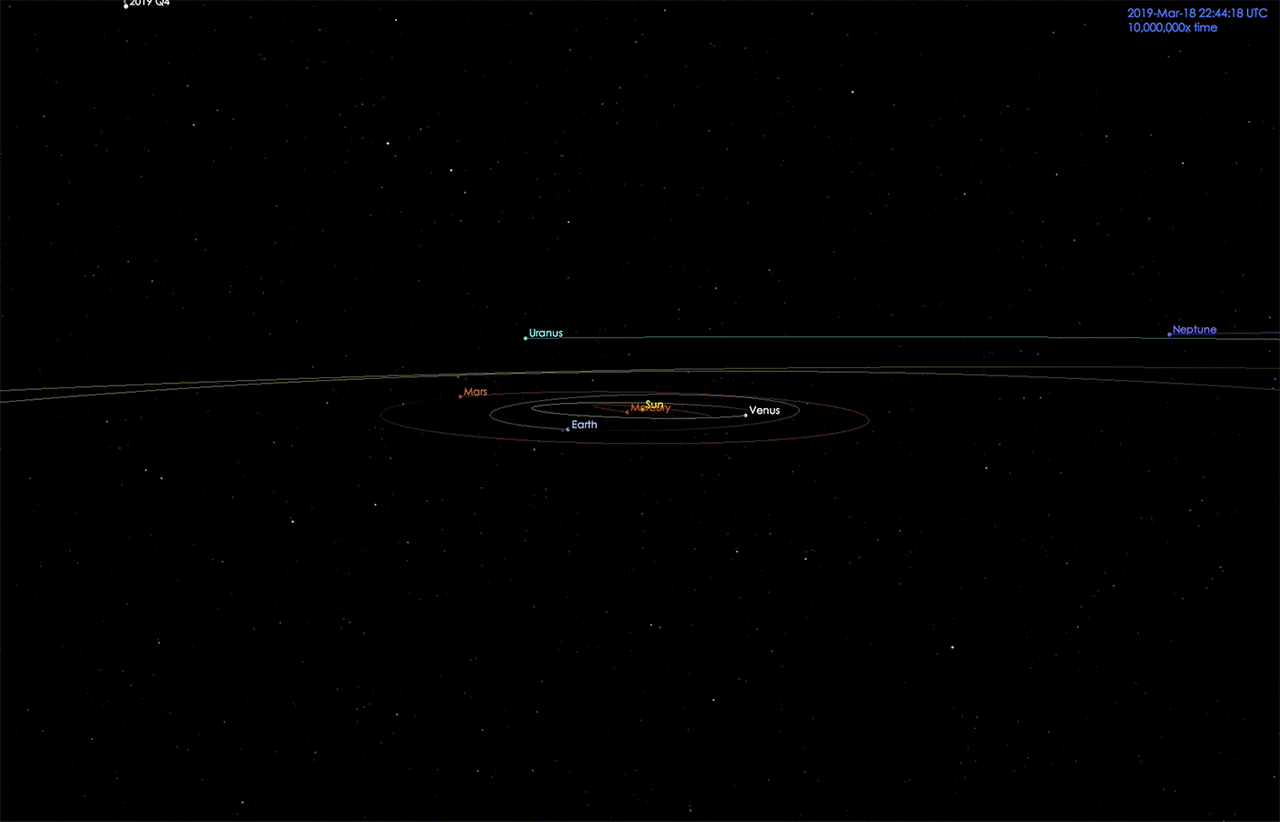September 14, 2019
Borisov
One of the questions that was left unanswered in the wake of the recent passing through the solar system of the interstellar object Omuamua was whether this was a vanishingly rare event, or if such interstellar objects pass through fairly frequently and we hadn't noticed them.
Well, there is now some evidence that it may be the latter.
While not yet officially confirmed to be an extrasolar object, C/2019 Q4 tentatively named Borisov, after its discoverer, is coming in at about solar system escape velocity and is expected to leave the solar system after doing a loop around the sun.

This is a rather larger object than Omuanua between 1 and 30 kilometers across and Astronomers will have time to examine it in considerable detail.
That's all we know now, but one of The Brickmuppet's Crack Team of Science Babes offers a bit of speculation....

It should be noted as well that Mr.Gennady Borisov, the Russian amateur astronomer who discovered this comet, pulled off quite the impressive feat with his homemade telescope found what the algorithms had missed.
[quote] Aside from how prominent or not Gennady’s comet will become, the most amazing thing is that he beat the automated surveys to the punch. These days nearly all comets and many asteroids are found by professional astronomers using robotic telescopes hooked up to sensitive cameras and computers. Large areas of the sky are covered each clear night. If a fuzzy, moving object is detected by the computer, astronomers are alerted, follow-up observations are made and the new object receives a letter, number and the survey’s name. That’s why there are a plethora of comets in the past 15 years with names like LINEAR (Lincoln Near-Earth Asteroid Survey), Pan-STARRS (Panoramic Survey Telescope & Rapid Response System), LONEOS (Lowell Observatory Near-Earth-Object Search) and others.
This one however, is named "Borisov".
Well, there is now some evidence that it may be the latter.
While not yet officially confirmed to be an extrasolar object, C/2019 Q4 tentatively named Borisov, after its discoverer, is coming in at about solar system escape velocity and is expected to leave the solar system after doing a loop around the sun.

.gif via JPL
This is a rather larger object than Omuanua between 1 and 30 kilometers across and Astronomers will have time to examine it in considerable detail.
That's all we know now, but one of The Brickmuppet's Crack Team of Science Babes offers a bit of speculation....

Art by Atomicspacemonkey
"Given that its closest approach to Earth will be in December, it is also possible (albeit unlikely) that a very austere probe might be sent. Note that Elon Musk is planning a full up launch of his super rocket in October, some kitbashed probe might make a better payload than the water that normally acts as ballast on these things."
It should be noted as well that Mr.Gennady Borisov, the Russian amateur astronomer who discovered this comet, pulled off quite the impressive feat with his homemade telescope found what the algorithms had missed.
[quote] Aside from how prominent or not Gennady’s comet will become, the most amazing thing is that he beat the automated surveys to the punch. These days nearly all comets and many asteroids are found by professional astronomers using robotic telescopes hooked up to sensitive cameras and computers. Large areas of the sky are covered each clear night. If a fuzzy, moving object is detected by the computer, astronomers are alerted, follow-up observations are made and the new object receives a letter, number and the survey’s name. That’s why there are a plethora of comets in the past 15 years with names like LINEAR (Lincoln Near-Earth Asteroid Survey), Pan-STARRS (Panoramic Survey Telescope & Rapid Response System), LONEOS (Lowell Observatory Near-Earth-Object Search) and others.
This one however, is named "Borisov".
Posted by: The Brickmuppet at
09:38 PM
| Comments (1)
| Add Comment
Post contains 373 words, total size 4 kb.
35kb generated in CPU 0.0774, elapsed 0.2335 seconds.
71 queries taking 0.2244 seconds, 379 records returned.
Powered by Minx 1.1.6c-pink.
71 queries taking 0.2244 seconds, 379 records returned.
Powered by Minx 1.1.6c-pink.









